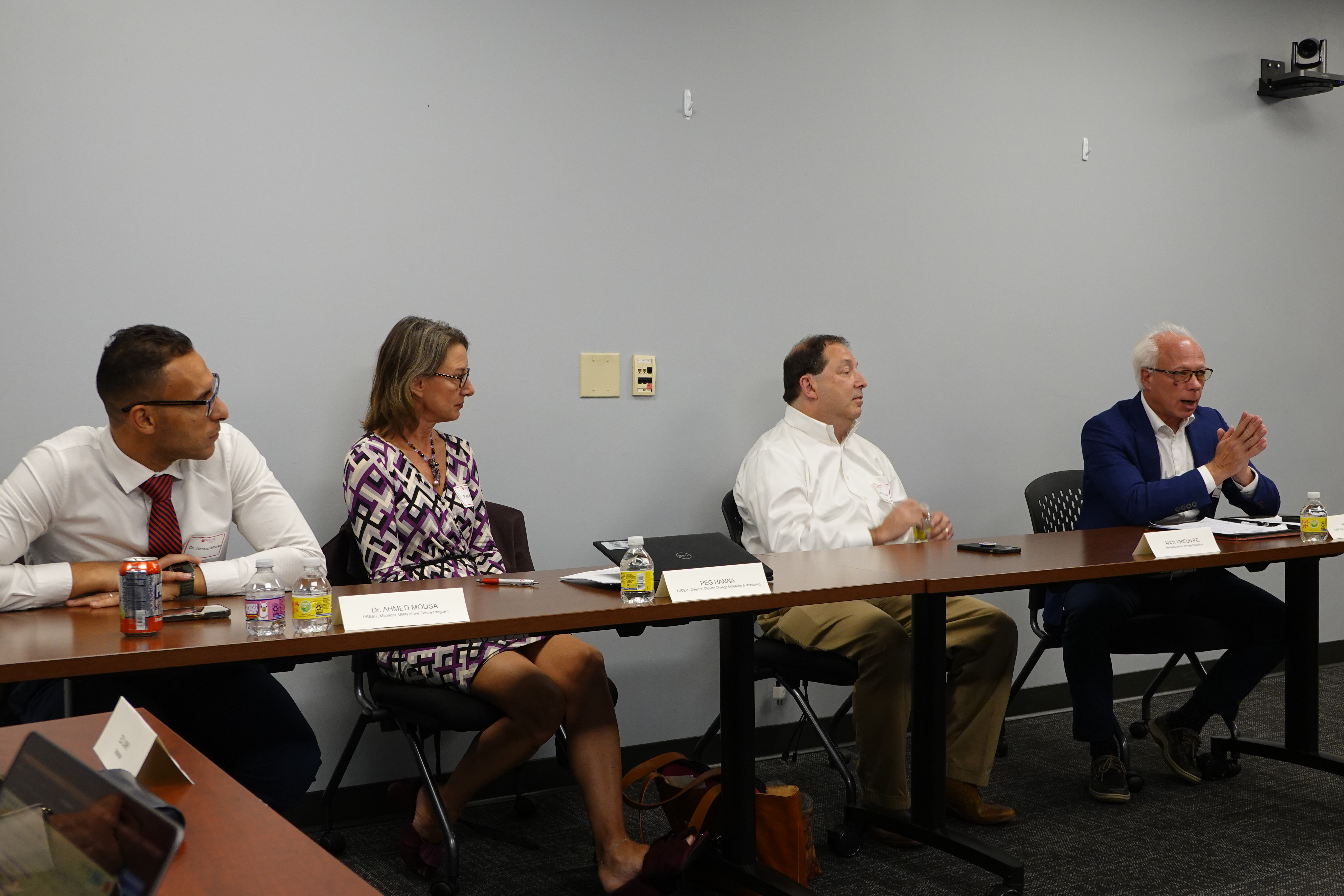The Rutgers Professional Science Master’s program offers students opportunities to explore critical issues linked to their fields. One such issue is sustainability, a factor that is of growing importance. New Jersey is committed to reducing carbon emissions and combatting climate change. In February 2023, Governor Phil Murphy announced the state’s ambitious goal to achieve 100% clean energy by 2035. We invited four experts across industrial sectors to answer the question, is it feasible to achieve net zero carbon emissions in this time frame?
The panel was moderated by Ed Linky, instructor of our course Fundamentals of Sustainability. Below are the panelists and their insights.

Peg Hanna, NJDEP, Director, Climate Change Mitigation and Monitoring
Hanna has worked at NJDEP for her entire career. At NJDEP, she currently leads a division to pursue climate mitigation.
The impact of climate change is more significant than we realize, she said. Climate change has environmental impacts as well as societal ones, affecting migration, shifts in ecology, and more.
Hanna’s work focuses on reducing emissions from different sectors, including transportation, buildings, electric generation, etc.
Hanna highlighted the importance of planning and taking adequate action to reach these goals. Climate mitigation will happen through hard work and tough decisions by many people, said Hanna.
Ray Cantor, Esq. Vice President, Government Relations, New Jersey Business and Industry Association Cantor is the Vice President of Government Relations of the New Jersey Business and Industry Association. The NJBIA is the state’s largest business association, representing organizations from the largest companies in New Jersey to local companies. He has spent 26 years in state government, having worked in state legislature, with 40 years of public policy experience.
Cantor argued that we should refrain from committing to net zero by 2035 in New Jersey. Our solutions to reducing emissions are complex, he argued, and there are downsides to pursuing certain policies. When it comes to achieving net zero, this involves replacing an already developed and effective energy system. The problem is incredibly complex.
Additionally, Cantor believes that by committing to reaching climate goals in short time frames, New Jersey is locking itself into using modern-day technology. A longer time frame would allow for further development of technology and infrastructure to achieve this goal.
Andy Kricun P.E., Managing Director, Project Moonshot and Senior Advisor of The Water Center at the University of Pennsylvania
Kricun shared a quote from George Eliot: “The growing good of the world is partly dependent on unhistoric acts.”
He advised students to look at their professions and make an intentional difference.
Kricun’s background is in the water sector, having managed the Camden County Utilities Authority. When it comes to the water sector, an important reason for moving towards net zero is to sustainably provide water essential for human health.
For water treatment plants, achieving net zero is necessary to minimize environmental impact and ensure that the plant is invulnerable to power outages caused by extreme weather events after seeing Hurricane Sandy’s impact on New Jersey. The Camden County Utilities Authority chose to become resilient so that the plant could continue treating wastewater in the event of a power outage. Learn more about how the Camden County Utilities Authority net zero goal. Not only did achieving net zero meet a sustainability goal, but also an economic purpose.
Ahmed Mousa Ph.D., Manager, Utility of the Future Program, Public Service Electric and Gas Co.
Mousa leads PSE&G’s Utility of the Future Program. He also serves as an externship advisor in the MBS Externship Exchange program.
When it comes to utilities, PSE&G has pursued a long journey from ensuring safety, to reliability, to resiliency and cybersecurity. Environmental sustainability has been a new addition.
There’s much work to do on many different levels. Every action is taken through a sustainability lens, said Mousa. PSE&G shifted to address modern problems including resiliency, cybersecurity, and ESG.
Mousa advised students to consider many factors when making decisions, including safety, reliability, resiliency, cybersecurity, and the impact on the customer. He also highlighted the importance of modeling and using data to gather insights.
Echoing a sentiment shared across panelists, Mousa noted that achieving net zero requires many people to work together.
To view all our upcoming events, check out our events page. You can also follow us on X (formerly Twitter), LinkedIn, Facebook, and Instagram to stay up to date.